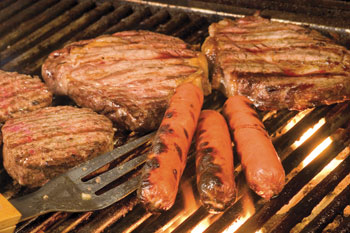By Mike DeMars, Fire Inspector Central Fire Protection District
As we enjoy the summer months with friends and family, there are several safety items to consider that can reduce the chance of fire or injury during summer activities.
•••
Barbecues

Remember that barbeque grills are to be used outdoors only. If you are using a charcoal-burning grill, make sure that it is in a well-ventilated area. Burning charcoal can produce high levels of carbon monoxide when used in an enclosed space such as a garage, tent or camper. All types of grills should be kept away from any combustible materials when in use, including eaves and overhangs of homes. It is recommended that all open flame cooking devices should be kept at least ten feet from any combustible materials.
When cooking, never leave the barbeque unattended. The same rule for cooking indoors should be applied outdoors. Maintain a three-foot safety zone around the cooking area. This area should be kept clear of children, pets and any flammable items. Use only charcoal starter fluid to light the fire. Do not use other liquids such as gasoline or kerosene. Many flammable and combustible liquids produce flammable vapors. These vapors, when ignited, can flash back and cause burn injuries. Once the fire is started, do not add more starter fluid. This is a dangerous practice and can result in burn injuries as well.
When the cooking is done, make sure that the grill is stored safely. Clean the grill of any remaining food or excess grease. The grill should be cool to the touch and coals or ashes disposed of properly. Coals and ashes should be removed and placed in a metal container with a lid. Water can be added to help the cooling process. Never dispose of coals directly into trash containers. Coals can retain heat and smolder for hours. Dispose of the coals when they are cool enough to touch.
July is the peak month for grill fires. Half of all reported grill fires are on decks, patios and balconies. Most of these fires also result in burn injuries.
Beach Safety
This is especially important if you are in a remote or unfamiliar area. Tides, currents and the water depth are things to be considered before entering the water. Even experienced swimmers can be caught off guard by strong currents. Conditions can change quickly and without warning.
Be aware of your surroundings at all times. Beware of floating debris after rainfall. Rivers fill with rainwater and wash debris into the ocean. This debris can be floating just below the surface or mix in with waves presenting a hazard to swimmers. Never turn your back on the ocean. Waves can knock you down and cause serious injuries.
Know your limits before entering the ocean. If you visit the ocean often, you should learn how to swim. If you are visiting the beach with small children, never leave them unattended or out of your sight.
Hotel Safety
Become familiar with your surroundings when staying in a hotel. Note the location of the nearest fire extinguisher to your room and the nearest exit. If you are in a room above the first floor, find the location of the nearest stairway. The stairs, not the elevator, will be the way to exit in an emergency. All hotels are required to post safety information in each guest room. Emergency information is usually posted on the back of the door or adjacent to it. Become familiar with the safety rules for the building you are staying in.
In the event of an emergency when staying in hotel, remember your emergency plan. What if you hear the fire alarm while you are in your room? You should go to the nearest exit. If you are staying above the first floor, use stairs to exit instead of the elevator. As you evacuate the building, take your room key with you and close doors behind you as you go. If there is smoke from a fire, remember to crawl low under the smoke. Do not reenter the building unless it is declared safe to do so by hotel staff or emergency personnel.
If you are unable to exit the building due to dangerous conditions, you may have to return to your room for safety. This is referred to as “protecting in place.” If there is smoke from a fire, keep the door to your room closed. Turn off any fans or air conditioners and block cracks in the door with towels. Use the room phone or cell phone to call for help. If there is no phone service, call for help from your window. When checking into your hotel, you might want to ask if there is any emergency information specific to that area or the building that you are staying in.
These are just a few summer activity safety tips. For more information on fire safety, contact your local Fire Department.